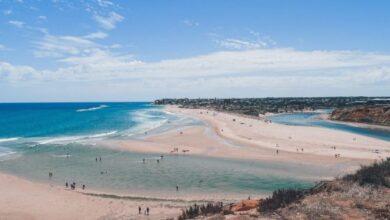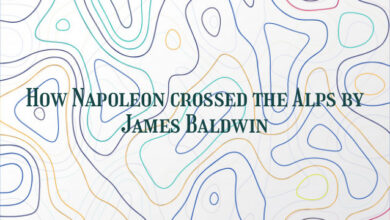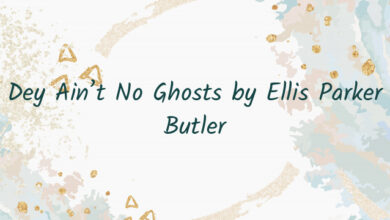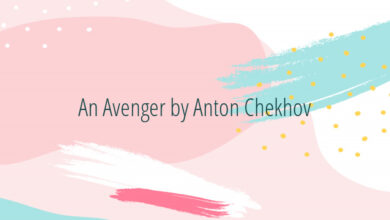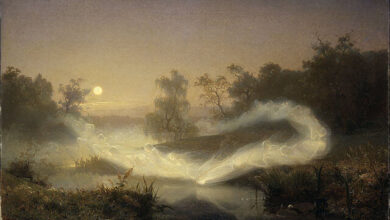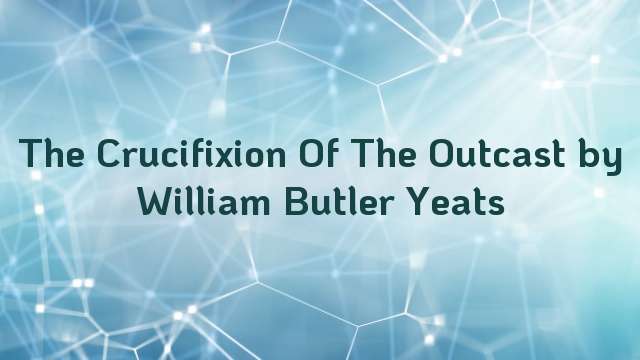
The Crucifixion Of The Outcast by William Butler Yeats
A man, with thin brown hair and a pale face, half ran, half walked, along the road that wound from the south to the town of Sligo. Many called him Cumhal, the son of Cormac, and many called him the Swift, Wild Horse; and he was a gleeman, and he wore a short parti-coloured doublet, and had pointed shoes, and a bulging wallet. Also he was of the blood of the Ernaans, and his birth-place was the Field of Gold; but his eating and sleeping places where the four provinces of Eri, and his abiding place was not upon the ridge of the earth. His eyes strayed from the Abbey tower of the White Friars and the town battlements to a row of crosses which stood out against the sky upon a hill a little to the eastward of the town, and he clenched his fist, and shook it at the crosses. He knew they were not empty, for the birds were fluttering about them; and he thought how, as like as not, just such another vagabond as himself was hanged on one of them; and he muttered: ‘If it were hanging or bowstringing, or stoning or beheading, it would be bad enough. But to have the birds pecking your eyes and the wolves eating your feet! I would that the red wind of the Druids had withered in his cradle the soldier of Dathi, who brought the tree of death out of barbarous lands, or that the lightning, when it smote Dathi at the foot of the mountain, had smitten him also, or that his grave had been dug by the green-haired and green-toothed merrows deep at the roots of the deep sea.’
While he spoke, he shivered from head to foot, and the sweat came out upon his face, and he knew not why, for he had looked upon many crosses. He passed over two hills and under the battlemented gate, and then round by a left-hand way to the door of the Abbey. It was studded with great nails, and when he knocked at it, he roused the lay brother who was the porter, and of him he asked a place in the guest-house. Then the lay brother took a glowing turf on a shovel, and led the way to a big and naked outhouse strewn with very dirty rushes; and lighted a rush-candle fixed between two of the stones of the wall, and set the glowing turf upon the hearth and gave him two unlighted sods and a wisp of straw, and showed him a blanket hanging from a nail, and a shelf with a loaf of bread and a jug of water, and a tub in a far corner. Then the lay brother left him and went back to his place by the door. And Cumhal the son of Cormac began to blow upon the glowing turf that he might light the two sods and the wisp of straw; but the sods and the straw would not light, for they were damp. So he took off his pointed shoes, and drew the tub out of the corner with the thought of washing the dust of the highway from his feet; but the water was so dirty that he could not see the bottom. He was very hungry, for he had not eaten all that day; so he did not waste much anger upon the tub, but took up the black loaf, and bit into it, and then spat out the bite, for the bread was hard and mouldy. Still he did not give way to his anger, for he had not drunken these many hours; having a hope of heath beer or wine at his day’s end, he had left the brooks untasted, to make his supper the more delightful. Now he put the jug to his lips, but he flung it from him straightway, for the water was bitter and ill-smelling. Then he gave the jug a kick, so that it broke against the opposite wall, and he took down the blanket to wrap it about him for the night. But no sooner did he touch it than it was alive with skipping fleas. At this, beside himself with anger, he rushed to the door of the guest- house, but the lay brother, being well accustomed to such outcries, had locked it on the outside; so he emptied the tub and began to beat the door with it, till the lay brother came to the door and asked what ailed him, and why he woke him out of sleep. ‘What ails me!’ shouted Cumhal, ‘are not the sods as wet as the sands of the Three Rosses? and are not the fleas in the blanket as many as the waves of the sea and as lively? and is not the bread as hard as the heart of a lay brother who has forgotten God? and is not the water in the jug as bitter and as ill-smelling as his soul? and is not the foot-water the colour that shall be upon him when he has been charred in the Undying Fires?’ The lay brother saw that the lock was fast, and went back to his niche, for he was too sleepy to talk with comfort. And Cumhal went on beating at the door, and presently he heard the lay brother’s foot once more, and cried out at him, ‘O cowardly and tyrannous race of friars, persecutors of the bard and the gleeman, haters of life and joy! O race that does not draw the sword and tell the truth! O race that melts the bones of the people with cowardice and with deceit!’
‘Gleeman,’ said the lay brother, ‘I also make rhymes; I make many while I sit in my niche by the door, and I sorrow to hear the bards railing upon the friars. Brother, I would sleep, and therefore I make known to you that it is the head of the monastery, our gracious abbot, who orders all things concerning the lodging of travellers.’
‘You may sleep,’ said Cumhal, ‘I will sing a bard’s curse on the abbot. ‘And he set the tub upside down under the window, and stood upon it, and began to sing in a very loud voice. The singing awoke the abbot, so that he sat up in bed and blew a silver whistle until the lay brother came to him. ‘I cannot get a wink of sleep with that noise,’ said the abbot. ‘What is happening?’
‘It is a gleeman,’ said the lay brother, ‘who complains of the sods, of the bread, of the water in the jug, of the foot-water, and of the blanket. And now he is singing a bard’s curse upon you, O brother abbot, and upon your father and your mother, and your grandfather and your grandmother, and upon all your relations.’
‘Is he cursing in rhyme?’
‘He is cursing in rhyme, and with two assonances in every line of his curse.’
The abbot pulled his night-cap off and crumpled it in his hands, and the circular brown patch of hair in the middle of his bald head looked like an island in the midst of a pond, for in Connaught they had not yet abandoned the ancient tonsure for the style then coming into use. ‘If we do not somewhat,’ he said, ‘he will teach his curses to the children in the street, and the girls spinning at the doors, and to the robbers upon Ben Bulben.’
‘Shall I go, then,’ said the other, ‘and give him dry sods, a fresh loaf, clean water in a jug, clean foot-water, and a new blanket, and make him swear by the blessed Saint Benignus, and by the sun and moon, that no bond be lacking, not to tell his rhymes to the children in the street, and the girls spinning at the doors, and the robbers upon Ben Bulben?’
‘Neither our Blessed Patron nor the sun and moon would avail at all,’ said the abbot; ‘for to-morrow or the next day the mood to curse would come upon him, or a pride in those rhymes would move him, and he would teach his lines to the children, and the girls, and the robbers. Or else he would tell another of his craft how he fared in the guest-house, and he in his turn would begin to curse, and my name would wither. For learn there is no steadfastness of purpose upon the roads, but only under roofs and between four walls. Therefore I bid you go and awaken Brother Kevin, Brother Dove, Brother Little Wolf, Brother Bald Patrick, Brother Bald Brandon, Brother James and Brother Peter. And they shall take the man, and bind him with ropes, and dip him in the river that he shall cease to sing. And in the morning, lest this but make him curse the louder, we will crucify him.’
‘The crosses are all full,’ said the lay brother.
‘Then we must make another cross. If we do not make an end of him another will, for who can eat and sleep in peace while men like him are going about the world? Ill should we stand before blessed Saint Benignus, and sour would be his face when he comes to judge us at the Last Day, were we to spare an enemy of his when we had him under our thumb! Brother, the bards and the gleemen are an evil race, ever cursing and ever stirring up the people, and immoral and immoderate in all things, and heathen in their hearts, always longing after the Son of Lir, and Aengus, and Bridget, and the Dagda, and Dana the Mother, and all the false gods of the old days; always making poems in praise of those kings and queens of the demons, Finvaragh, whose home is under Cruachmaa, and Red Aodh of Cnocna-Sidhe, and Cleena of the Wave, and Aoibhell of the Grey Rock, and him they call Donn of the Vats of the Sea; and railing against God and Christ and the blessed Saints.’ While he was speaking he crossed himself, and when he had finished he drew the nightcap over his ears, to shut out the noise, and closed his eyes, and composed himself to sleep.
The lay brother found Brother Kevin, Brother Dove, Brother Little Wolf, Brother Bald Patrick, Brother Bald Brandon, Brother James and Brother Peter sitting up in bed, and he made them get up. Then they bound Cumhal, and they dragged him to the river, and they dipped him in it at the place which was afterwards called Buckley’s Ford.
‘Gleeman,’ said the lay brother, as they led him back to the guest- house, ‘why do you ever use the wit which God has given you to make blasphemous and immoral tales and verses? For such is the way of your craft. I have, indeed, many such tales and verses well nigh by rote, and so I know that I speak true! And why do you praise with rhyme those demons, Finvaragh, Red Aodh, Cleena, Aoibhell and Donn? I, too, am a man of great wit and learning, but I ever glorify our gracious abbot, and Benignus our Patron, and the princes of the province. My soul is decent and orderly, but yours is like the wind among the salley gardens. I said what I could for you, being also a man of many thoughts, but who could help such a one as you?’
‘Friend,’ answered the gleeman, ‘my soul is indeed like the wind, and it blows me to and fro, and up and down, and puts many things into my mind and out of my mind, and therefore am I called the Swift, Wild Horse.’ And he spoke no more that night, for his teeth were chattering with the cold.
The abbot and the friars came to him in the morning, and bade him get ready to be crucified, and led him out of the guest-house. And while he still stood upon the step a flock of great grass-barnacles passed high above him with clanking cries. He lifted his arms to them and said, ‘O great grass-barnacles, tarry a little, and mayhap my soul will travel with you to the waste places of the shore and to the ungovernable sea!’ At the gate a crowd of beggars gathered about them, being come there to beg from any traveller or pilgrim who might have spent the night in the guest-house. The abbot and the friars led the gleeman to a place in the woods at some distance, where many straight young trees were growing, and they made him cut one down and fashion it to the right length, while the beggars stood round them in a ring, talking and gesticulating. The abbot then bade him cut off another and shorter piece of wood, and nail it upon the first. So there was his cross for him; and they put it upon his shoulder, for his crucifixion was to be on the top of the hill where the others were. A half-mile on the way he asked them to stop and see him juggle for them; for he knew, he said, all the tricks of Aengus the Subtle- hearted. The old friars were for pressing on, but the young friars would see him: so he did many wonders for them, even to the drawing of live frogs out of his ears. But after a while they turned on him, and said his tricks were dull and a shade unholy, and set the cross on his shoulders again. Another half-mile on the way, and he asked them to stop and hear him jest for them, for he knew, he said, all the jests of Conan the Bald, upon whose back a sheep’s wool grew. And the young friars, when they had heard his merry tales, again bade him take up his cross, for it ill became them to listen to such follies. Another half-mile on the way, he asked them to stop and hear him sing the story of White-breasted Deirdre, and how she endured many sorrows, and how the sons of Usna died to serve her. And the young friars were mad to hear him, but when he had ended they grew angry, and beat him for waking forgotten longings in their hearts. So they set the cross upon his back and hurried him to the hill.
When he was come to the top, they took the cross from him, and began to dig a hole to stand it in, while the beggars gathered round, and talked among themselves. ‘I ask a favour before I die,’ says Cumhal.
‘We will grant you no more delays,’ says the abbot.
‘I ask no more delays, for I have drawn the sword, and told the truth, and lived my vision, and am content.’
‘Would you, then, confess?’
‘ By sun and moon, not I; I ask but to be let eat the food I carry in my wallet. I carry food in my wallet whenever I go upon a journey, but I do not taste of it unless I am well-nigh starved. I have not eaten now these two days.’
‘You may eat, then,’ says the abbot, and he turned to help the friars dig the hole.
The gleeman took a loaf and some strips of cold fried bacon out of his wallet and laid them upon the ground. ‘I will give a tithe to the poor,’ says he, and he cut a tenth part from the loaf and the bacon. ‘Who among you is the poorest?’ And thereupon was a great clamour, for the beggars began the history of their sorrows and their poverty, and their yellow faces swayed like Gara Lough when the floods have filled it with water from the bogs.
He listened for a little, and, says he, ‘I am myself the poorest, for I have travelled the bare road, and by the edges of the sea; and the tattered doublet of particoloured cloth upon my back and the torn pointed shoes upon my feet have ever irked me, because of the towered city full of noble raiment which was in my heart. And I have been the more alone upon the roads and by the sea because I heard in my heart the rustling of the rose-bordered dress of her who is more subtle than Aengus, the Subtle-hearted, and more full of the beauty of laughter than Conan the Bald, and more full of the wisdom of tears than White-breasted Deirdre, and more lovely than a bursting dawn to them that are lost in the darkness. Therefore, I award the tithe to myself; but yet, because I am done with all things, I give it unto you.’
So he flung the bread and the strips of bacon among the beggars, and they fought with many cries until the last scrap was eaten. But meanwhile the friars nailed the gleeman to his cross, and set it upright in the hole, and shovelled the earth in at the foot, and trampled it level and hard. So then they went away, but the beggars stared on, sitting round the cross. But when the sun was sinking, they also got up to go, for the air was getting chilly. And as soon as they had gone a little way, the wolves, who had been showing themselves on the edge of a neighbouring coppice, came nearer, and the birds wheeled closer and closer. ‘Stay, outcasts, yet a little while,’ the crucified one called in a weak voice to the beggars, ‘and keep the beasts and the birds from me.’ But the beggars were angry because he had called them outcasts, so they threw stones and mud at him, and went their way. Then the wolves gathered at the foot of the cross, and the birds flew lower and lower. And presently the birds lighted all at once upon his head and arms and shoulders, and began to peck at him, and the wolves began to eat his feet. ‘Outcasts,’ he moaned, ‘have you also turned against the outcast?’
